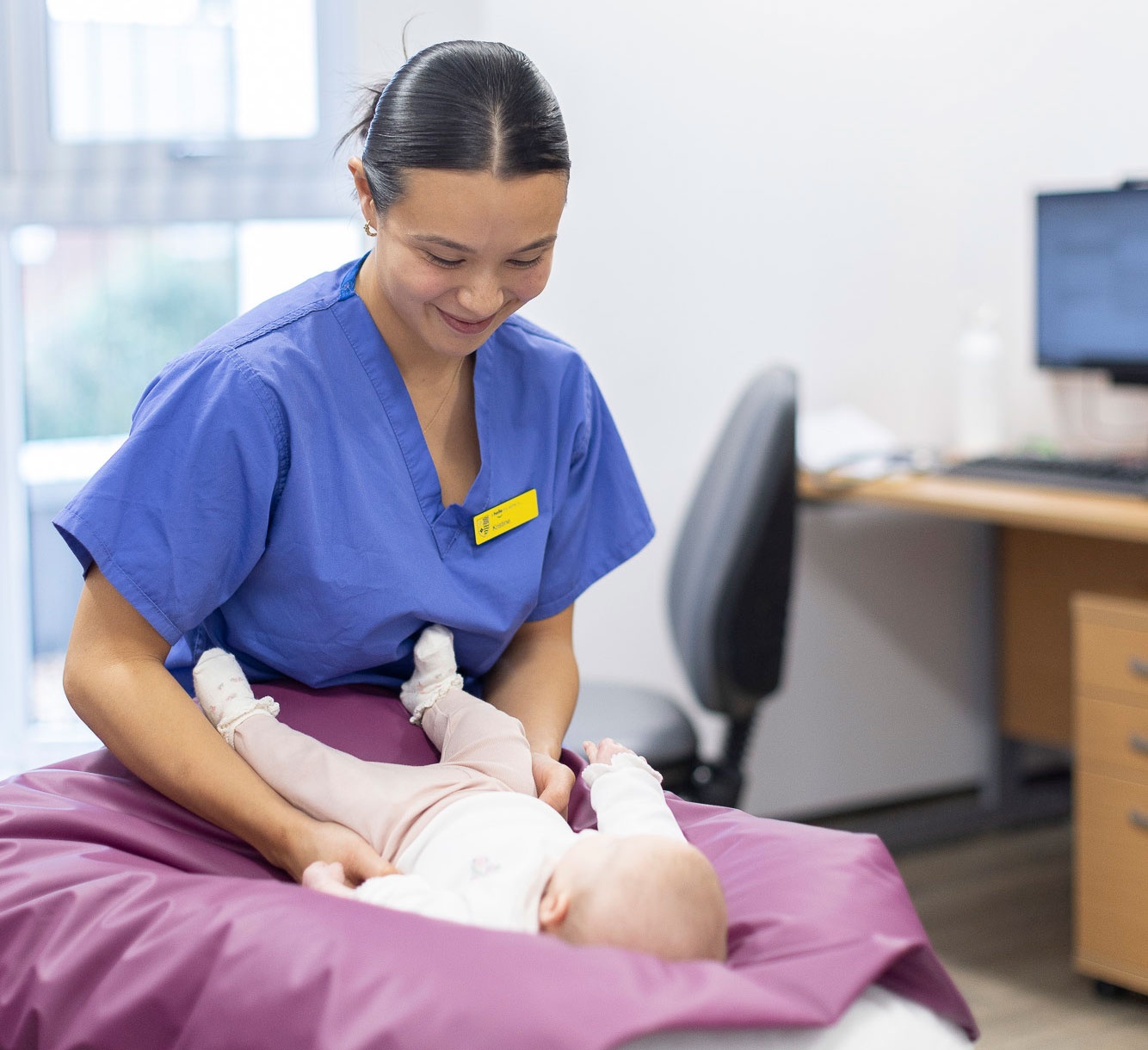Overview
This course has been designed to help registered practitioners further their ability to deliver healthcare through the safe and competent care of children of all ages.
It covers topics such as paediatric development, paediatric musculoskeletal examination, paediatric musculoskeletal interventions and paediatric musculoskeletal management, evidence-based practice, plus optional units such as professional development, and leadership and inter-professional collaboration.
You’ll also examine issues such as risk factors and public health, including breastfeeding, supine sleep in infancy, physical activity in children and conditions affecting the musculoskeletal health of children from birth to young adulthood.
Using a blend of live online classes and ready-to-use resources through our virtual learning environment, you’ll learn through a mix of live and recorded lectures, online reading materials and content taught through guided activities with your peers and staff.
Clinical paediatric experience is a key part of the course, either within your existing clinical environment or through observing our clinical educators in the Clinical and Rehabilitation Services team at Health Sciences University on our Bournemouth campus.
Course Details
Why Study MSc Musculoskeletal Paediatric Health?
Health Sciences University has been the primary provider of postgraduate musculoskeletal paediatric courses in Europe for over 15 years. The postgraduate courses within the HSU School of Chiropractic are developed to be aligned with professional practice, and adopt an approach of integrated learning, teaching, and assessment that is not only developing independent learning, but encouraging students to integrate theory and practice. The approach to learning and teaching within the course emphasizes: the diversity of leaners, autonomy of learning, life-long learning, and a dynamic learning experience.
Course Structure
The course has been designed in a format that allows students to complete their training in 2 years. There is also the possibility to register for individual units.
There are two taught units each term with 6 weeks of delivery. After each unit you will be working on an assessment for a few weeks before submitting your work. In both the first and second year, you will complete 4 units. In your second year, you will also complete a Dissertation. We also offer you the opportunity to complete the units at your own pace.
You do not need to come to HSU for any assessment as the whole course is completed remotely.
Find our more details about this course below:
MSc Musculoskeletal Paediatric Health – Course Specification
Unit Breakdown
Evidence-based practice 
Units
(Core Unit)
MPH7005 Evidence-based practice
This unit aims to allow you to provide a basis to understand the concepts and principles of evidence-based practice and have a critical awareness of the problems of their application in professional practice, to ensure your professional practice is underpinned by evidence, including robust research findings, patients’ views, and your own clinical expertise; and to develop the ability to identify clinical questions relevant to your practice, review and critique evidence in the area, and evaluate any change to enhance your professional practice.
Want to study this as a single unit?
To apply, please use the application link below. Alternatively, you can register your interest, please enquire via our form (at the bottom of this page).
Paediatric development 
Units
(Core Unit)
MPH7001 Paediatric development
This unit will allow you to advance your knowledge, attitudes and skills in paediatric development. This unit provides you with the cognitive knowledge supporting the clinical sciences relating to paediatric musculoskeletal care.
The unit provides you with the opportunity to apply, synthesize and evaluate how the cognitive knowledge base in paediatric development transfers directly into patient care. The aim is to further advance your proficiency at evaluating a range of typical and atypical developmental patterns throughout the paediatric spectrum from birth to young adulthood.
Want to study this as a single unit?
To apply, please use the application link below. Alternatively, you can register your interest, please enquire via our form (at the bottom of this page).
Paediatric MSK examination and diagnosis 
Units
(Core Unit)
MPH7002 Paediatric musculoskeletal examination and diagnosis
This unit will allow you to advance your knowledge, skills and attitudes required to examine and diagnose paediatric patients. When examining and diagnosing paediatric patients, you need to be able to integrate relevant patient data through appropriate history taking, physical examination, investigations, and psychosocial factors during a patient encounter.
The aim of this unit is to further advance your proficiency at examining and diagnosing paediatric patients presenting with musculoskeletal complaints over the paediatric spectrum from birth to young adulthood.
Want to study this as a single unit?
To apply, please use the application link below. Alternatively, you can register your interest, please enquire via our form (at the bottom of this page).
Paediatric MSK interventions 
Units
(Core Unit)
MPH7003 Paediatric musculoskeletal intervention
This unit will allow you to advance your knowledge, skills and attitudes required to evaluate and deliver interventions in paediatric patients with musculoskeletal complaints within your scope of practice.
The aim is to allow you to gain knowledge and understanding of commonly used therapies that might also sit outside of your scope of practice alongside public health and health promotion interventions in the paediatric musculoskeletal field. The aim is to further advance your proficiency and safety at providing evidence-based care of patients presenting with musculoskeletal complaints over the paediatric spectrum from birth to young adulthood.
Want to study this as a single unit?
To apply, please use the application link below. Alternatively, you can register your interest, please enquire via our form (at the bottom of this page).
Paediatric MSK management 
Units
(Core Unit)
MPH7004 Paediatric musculoskeletal management
This work-based learning unit will allow you to advance your knowledge, skills and attitudes required to manage paediatric patients. When managing patients, several factors will influence your clinical encounters and plans of care: child and family centred concepts, legal and ethical principles, as well as your professional values and behaviours.
The aim is to further advance your proficiency at managing paediatric patients presenting with musculoskeletal complaints over the paediatric spectrum from birth to young adulthood.
Want to study this as a single unit?
To apply, please use the application link below. Alternatively, you can register your interest, please enquire via our form (at the bottom of this page).
Research methods 
Units
(Core Unit)
MPH7006 Research methods
The unit aims to allow you to explore the philosophical underpinnings of research approaches and methodologies; to develop a critical understanding of qualitative, quantitative, and mixed-methods research designs; to explore and apply analysis of empirical research data; to develop appropriate original research questions and to systematically plan a research investigation; and to enhance your understanding of the ethical considerations of clinical research and how to apply these in the context of study design and implementation.
Want to study this as a single unit?
To apply, please use the application link below. Alternatively, you can register your interest, please enquire via our form (at the bottom of this page).
Leadership and interprofessional working 
Units
(Optional Unit)
MPH7009 Leadership and Interprofessional Working
In this unit, you will have the opportunity to expand your knowledge and understanding of leadership theories and frameworks, competencies of interprofessional collaboration, and approaches to working within teams. You will also consider your own values, beliefs, and personal working through reflective practice.
You will consider both the contemporary research on leadership and interprofessional working, current influences on healthcare organisations and policy, and your own experiences of working within teams.
Want to study this as a single unit?
To apply, please use the application link below. Alternatively, you can register your interest, please enquire via our form (at the bottom of this page).
Professional development 
Units
(Optional Unit)
MPH7008 Professional development
This unit aims to support you to identify your own learning needs and support development of knowledge, skills, and expertise within a specialised field or area of practice. You will explore professional development in practice, including professional identity, communication, and decision-making, and critically reflect on these areas in relation to your development and role as a practitioner. You will demonstrate reflective practice and develop personal responsibility in evaluating and improving professional practice.
Want to study this as a single unit?
To apply, please use the application link below. Alternatively, you can register your interest, please enquire via our form (at the bottom of this page).
Dissertation 
Units
MPH7007 Dissertation
The unit aims to allow you to develop your ability to critically evaluate current knowledge in a topic area; to identify and select problems relevant and appropriate to research inquiry, by conducting and completing an original and ethically-sound research investigation; to create knowledge to inform professional practice; and to report and disseminate findings in a manner that is professionally relevant and that contributes to professional development in a topic area.
Staff
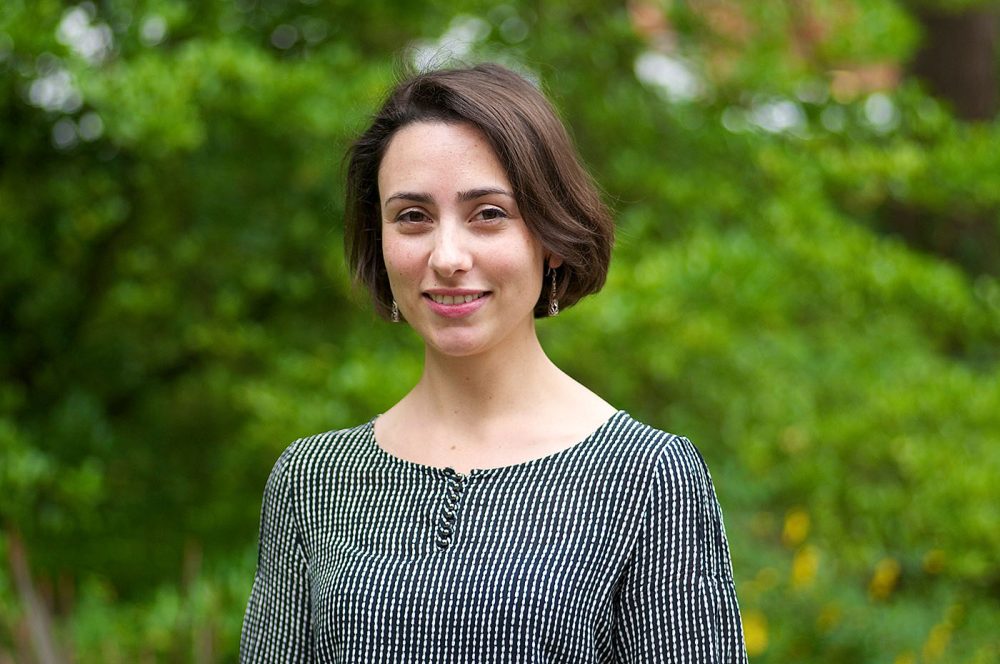
Course Leader
Aurélie Marchand
MChiro, PGCert, MSc ACPP, MMEd – Senior Lecturer (Clinical Management)
Aurélie is a Senior Lecturer teaching on the pre-registration chiropractic framework and the post-graduate MSc Paediatric MSK Health course. She mentors postgraduate students in their dissertations.
Full bioEntry Requirements
Entry Requirements 
Entry Requirements
This course is aimed at registered practitioners who wish to develop their knowledge and skills further regarding musculoskeletal paediatric health. Applicants will be required to have a recognised degree or professional qualification in a relevant healthcare subject and a minimum of two years relevant post-registration clinical experience. Examples of relevant professions include: chiropractic, physiotherapy, osteopathy, midwifery, occupational therapy, nursing or medicine.
Students must be registered with their respective professional regulatory body, e.g. Health and Care Professions Council (HCPC), General Medicine Council (GMC), Nursing and Midwifery Council (NMC), General Chiropractic Council (GCC), or equivalent outside of the UK and have practice insurance. The minimum entry requirement is a 2:2 degree in an appropriate subject area.
Overseas applicants will require IELTS with an overall score of 7.0 with no less than 6.0 in each component or equivalent.
Applicants with prior experience will be able to make use of the Recognition of Prior Learning (RPL) process to gain recognition of their credits. This would allow for completion of credits in a staged process by acknowledging previously completed units. Units being considered for RPL will be reviewed to ensure they meet the learning needs of the course and specific unit. The learning would generally be expected to be completed within 5 years, to ensure the content is still relevant, however this may be extended on review if the content was deemed appropriate and contemporary.
For general questions on MSc Musculoskeletal Paediatric Health entry requirements or to register your interest in the course please use the contact form at the bottom of this page.
International 
International
If your qualification is not listed here, please take a look at our international entry requirements page or get in touch with our admissions team on the form below. Please note, to be accepted onto this course; you will also need to demonstrate that you meet the minimum standards of English. For further information on English language requirements, please see the dedicated English language requirements page. More information on permission to study in the UK, can be found on our Visas and Immigration page.
Study a Single Unit 
Study a Single Unit
Studying individual units of this course is a great way to avoid the commitment of a full postgraduate certificate, or to dip your toes in the water before deciding if you want to take on the whole course. It is also a great way to add to your continuing professional development (CPD) requirements, as you can choose units that are relevant to your specific needs.
How to Apply 
Please Note: Applications are now open for September 2025 entry to this course. Places are limited and we encourage you to apply by 24 August 2025 to ensure your application is considered. International applicants should apply by 25 July 2025.
Still have questions about applying?
Course Fees
This course is offered via distance learning
Fees for all students are charged on a per-unit basis:
Home/ROI/Channel Islands
2024/25
- £870 per 20 credit unit
2025/26
- £910 per 20 credit unit
International
2024/25
- £870 per 20 credit unit
2025/26
- £910 per 20 credit unit
Please note that these fees are for the 2024/25 & 2025/26 academic years only and may be subject to increase in subsequent years of study. Any increase will be in line with our Tuition Fees Policy but will not be more than 5%.
Should you have any questions on course fees please see our Fees and Payment Information page or contact our admissions team on the form below.
Additional Course Costs
Additional costs are mandatory or optional costs which students will need to meet in order to fully participate in and complete their course. Students will need to budget for these costs separately as they are not included in the overall Tuition Fee they (or their sponsor) are charged.
For more information see Additional Costs page.
Visit our student finance pages for more information on:
Register your Interest
Register your Interest / Enquiry 

Why choose Health Sciences University
There are many benefits to studying at Health Sciences University, from our expertise and history in teaching health sciences, to our state-of-the-art facilities, on-site clinical training, and of course our location on the beautiful Bournemouth coast.
Latest News
Discover and read all the latest news, press releases and happenings here at Health Sciences University.
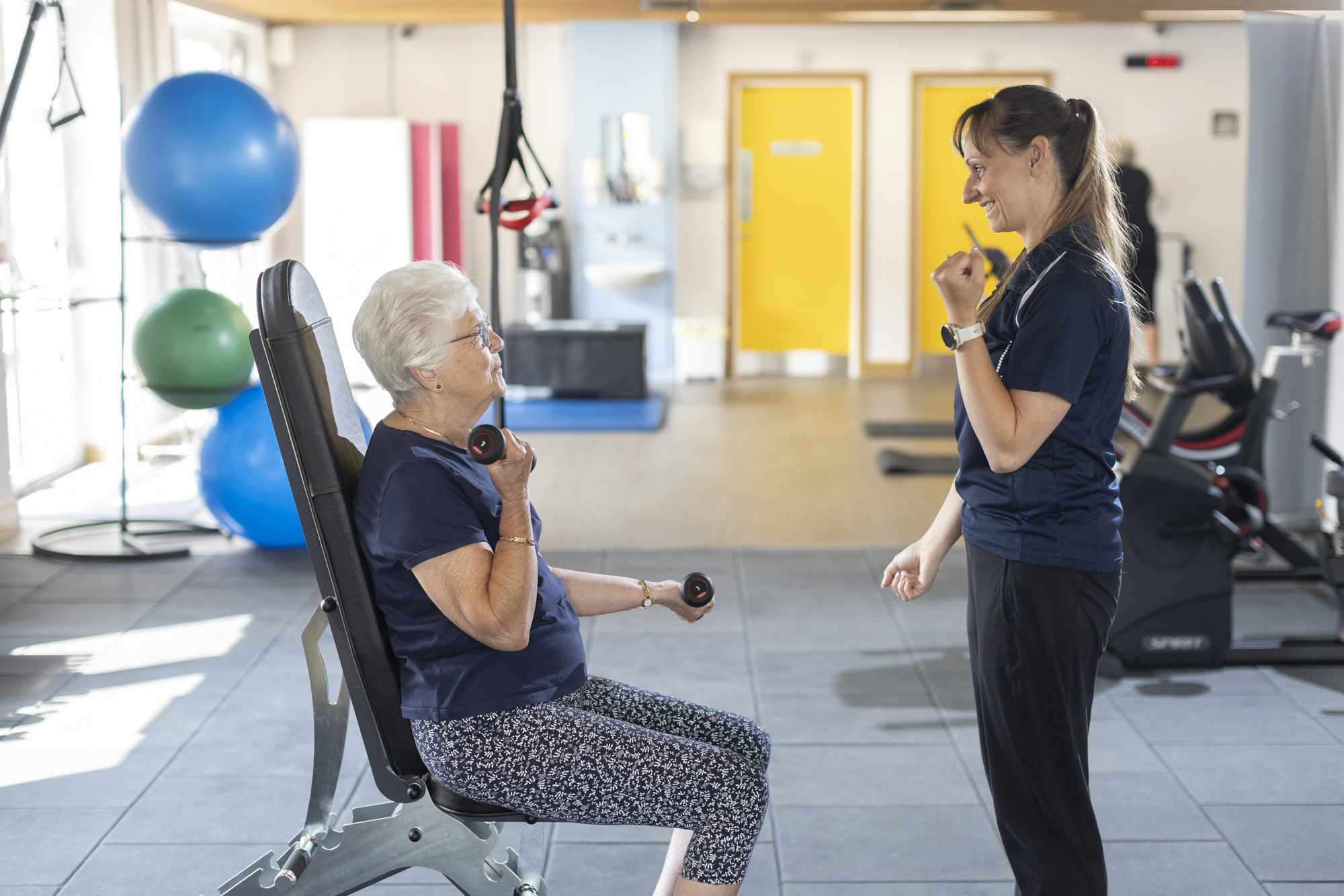
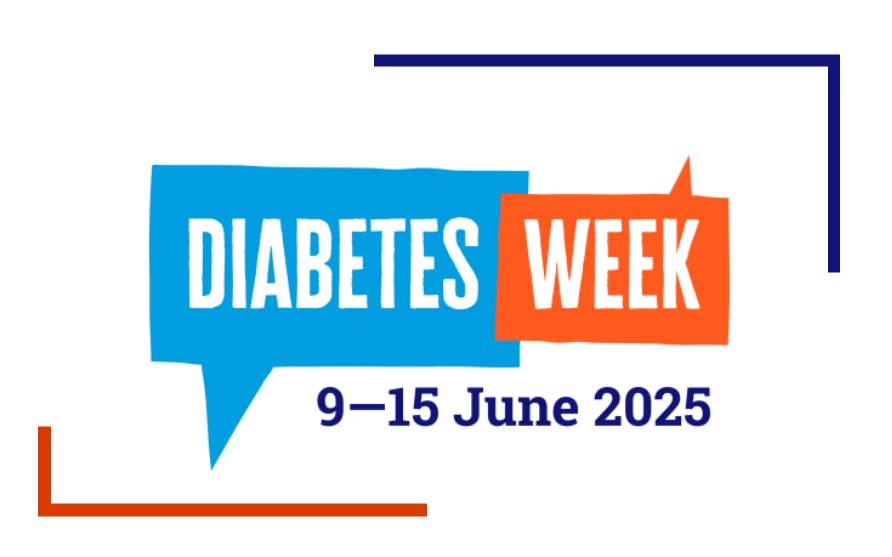
Diabetes affects foot health. Learn why checks matter and how HSU trains podiatry students to prevent complications.
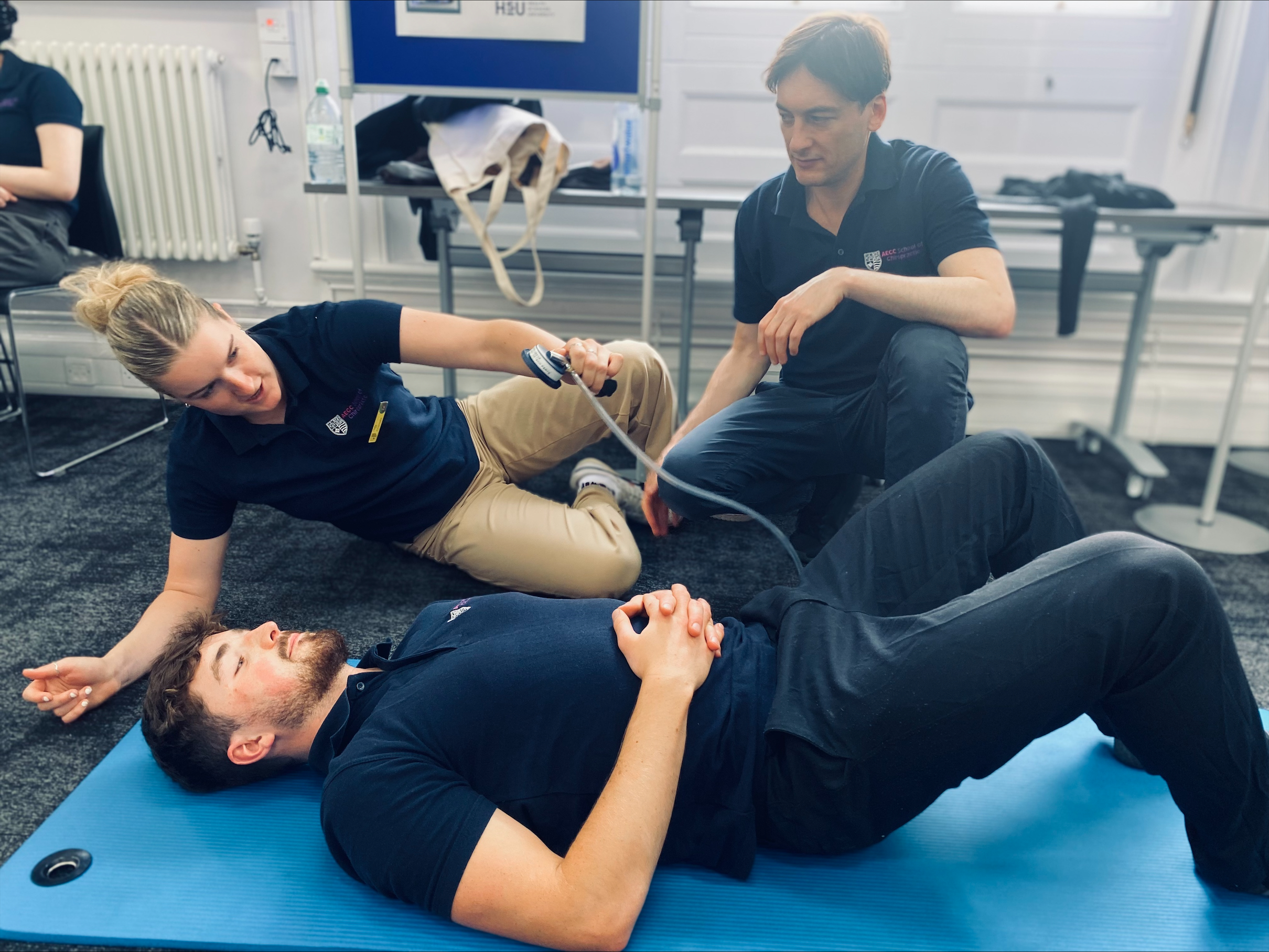
First-ever student-led Sports Placement Symposium celebrates clinical excellence, peer learning, and innovation in chiropractic education.

An immersive pilot week brought together 110 students from five allied health professions to collaboratively explore stroke care through simulation-based interprofessional learning, strengthening teamwork and patient-centred care skills.

HSU podiatry students supported runners at the 2024 TCS London Marathon, gaining real-world experience in foot care and injury treatment.
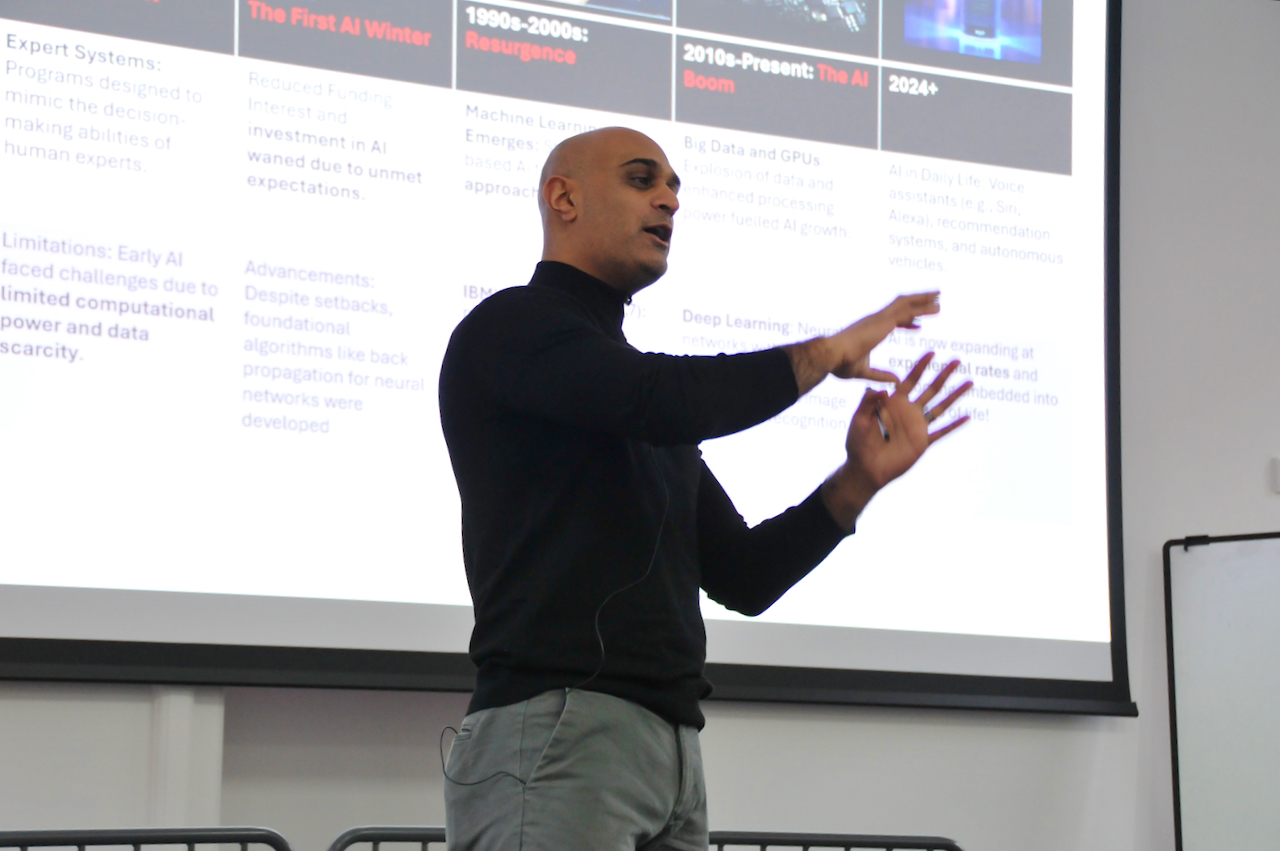
We were proud to deliver a ground breaking and first of its kind session on AI and Digital Technologies in Physiotherapy and Healthcare to our final-year physiotherapy students.
